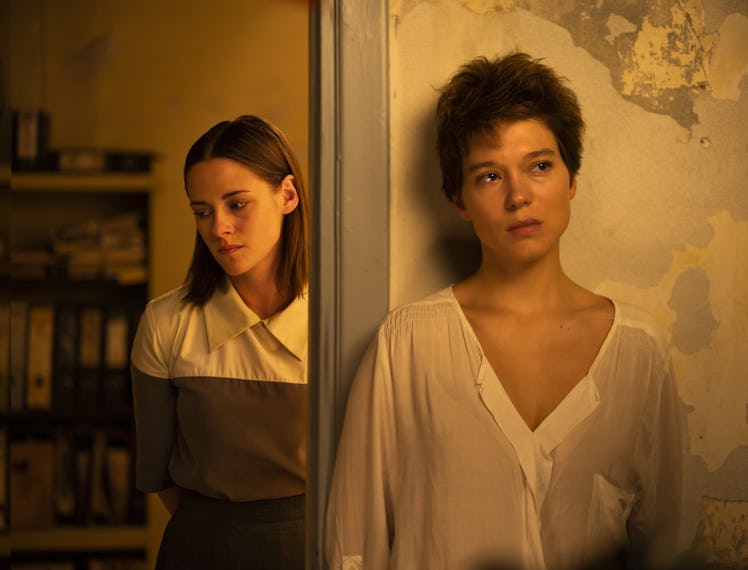Food and Frocks at the 2022 Cannes Film Festival
David Cronenberg's Crimes of the Future and Ruben Östlund's Triangle of Sadness were two delicious standouts at this year’s Festival de Cannes.

The ghost of past Cannes Film Festivals haunts the Boulevard de Croisette, which hosts its cinemas, the parties, and most certainly the yachts where deals were made and untoward behavior was ignored. “Harvey Weinstein used to run this place,” a film programmer told to me, with some retroactive horror. Since I began attending the festival in 2014, there has been a dedicated effort to slowly shift the balance of power. Though, as in most places, progress takes a zig-zag pattern. For instance, after multiple years of protests about the lack of gender and racial equity in directors represented in the festival, Cannes responded by adding a mandatory environmental fee for all attendees instead of directly addressing the problem.
The main entity supporting gender equity at Cannes is luxury brand conglomerate Kering. Since 2015, the brand has sponsored the “Women in Motion” series of public talks with women working in film. In previous years, these events have leaned heavily towards actresses and actresses-turned-directors (the better to wear the luxury frocks on the red carpet), but this year featured a talk with NFT artist Emily Yang as well as an award for Viola Davis, honoring her role as producer, author, and the most nominated Black woman in Oscar history.
At the posh awards dinner for Davis, there was a view across the city illuminated by boats, and an escort to walk attendees through medieval art-filled hallways to the toilet. Three women were honored before Ms. Davis: one was Ninja Thyberg, a young filmmaker who had been included in the canceled festival of 2020 and another was Ms. Kering herself, Salma Hayek (married to the evening’s host, CEO of Kering, François-Henri Pinault). Perhaps the most deserving and under-recognized woman to receive a mention that night was the chef Karime Lopez of Gucci Osteria, who created a streamlined menu (these are fashion people, after all) full of flavors inspired by her home country of Mexico. A secret truth of Cannes is that the food is some of the worst and most overpriced in France, with ceviche usually just consisting of raw fish served without citrus and most everything else overpriced and bordering on inedible. Lopez’s ceviche was real and a relief. The main course included crunchy cod strings in a tomato essence broth, which was delicious, yet also brought to mind one of the strongest scenes from one of the most entertaining movies at Cannes: Ruben Östlund’s Triangle of Sadness.
In Östlund’s uproarious farce about class and gender, a luxury ship sets off on a journey with two influencers, several dozen billionaires and their wives (and mistresses), a full staff, and a Marxist alcoholic captain played by Woody Harrelson. A storm interrupts the captain’s dinner, followed by hijinks, graphic seasickness, and a few survivors getting stuck on a deserted island. Much has been written about the realistic regurgitation of everything consumed, but less has been remarked upon the consumption of this dinner—including perfect sound effects of slurping oysters, cutting into foams, and sucking down emulsions. It is accurate, beautiful, and disgusting. In the midst of this, the captain eats a burger and fries. “I don’t like fine dining,” he announces.
Another great Cannes film about food is the new David Cronenberg feature, Crimes of the Future, the best film at the festival. Viggo Mortensen plays a renowned performance artist named Saul Tenser, who manifests new organs through an emotionally and physically draining process. These organs are then publicly and sensually removed from his body by his partner and lover, a former trauma surgeon named Caprice (Léa Seydoux). Mortensen plays much older than his 63-years in a vulnerable, sexy, and slightly pathetic portrayal of an aging artist. When Kristen Stewart arrives as a Tenser-groupie and inserts her fingers in his mouth before kissing him, he pulls back, though he thinks she’s attractive. “I’m not very good at the old sex,” he says.
Tenser’s struggles most with sleeping without pain and digesting his food: green and orange slop in trays. He needs machines to help not only with sex, but also with basic functions of sleeping and eating. All of these scenes are played for comedy in both broad and subtle movements and noises, in a brilliant and Oscar-worthy performance. Crimes of the Future is Cronenberg’s funniest film since A History of Violence, his first collaboration with Mortensen. Yet, as was the case with that earlier film, perhaps only one-fifth of the audience will laugh out loud.
The final scene is not funny at all, though it is a scene of eating, of accepting, of changing. Mortensen takes a voracious bite and cries. The film ends on this freeze frame in what feels unexpected, as if this story of an artist has created a new narrative form.
This article was originally published on